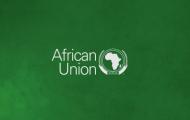Department Resources
Supply Chain Management Division Operations Support Services Directorate
Addis Ababa, Ethiopia
Supply Chain Management Division Operations Support Services Directorate
Outbreak Update: As of 3 May 2023, a total of 765,222,932 COVID-19 cases and 6,921,614 deaths (case fatality ratio [CFR]: 1%) have been reported globally by 232 countries and territories to the World Health Organization (WHO).
The African Union Commission (AUC) envisions “an integrated continent that is politically united based on the ideals of Pan Africanism an
Highlights of the cooperation with the GIZ-project “Support to the African Union on Migration and Displacement”
Violent extremism is a global issue.
Agenda 2063 is Africa’s development blueprint to achieve inclusive and sustainable socio-economic development over a 50-year period.














